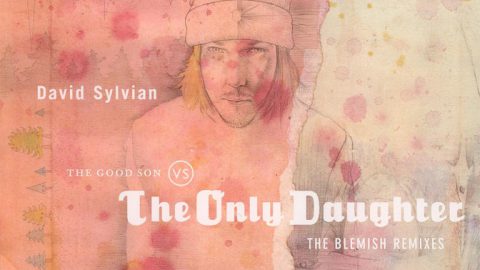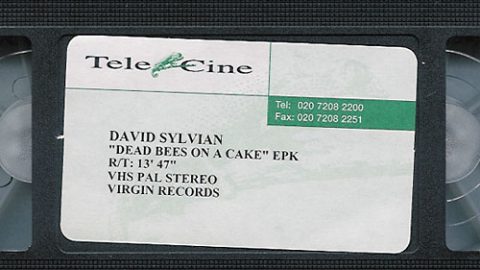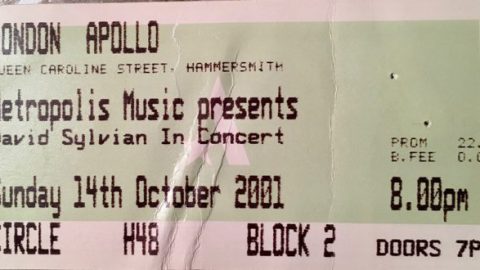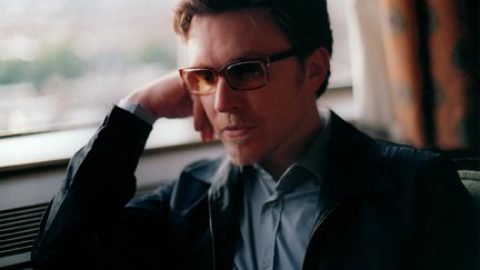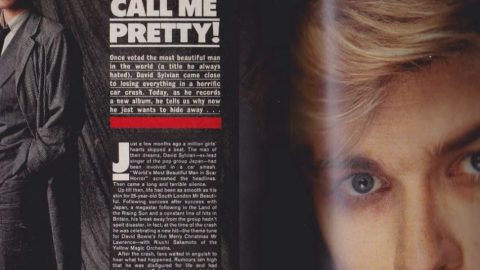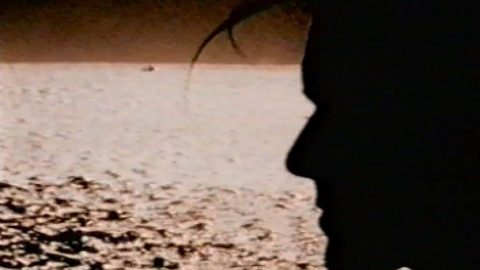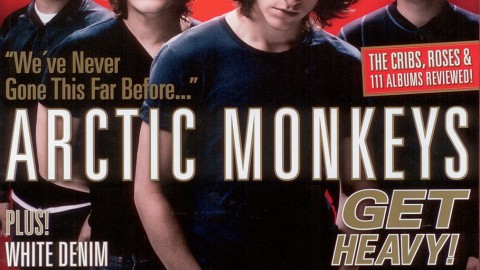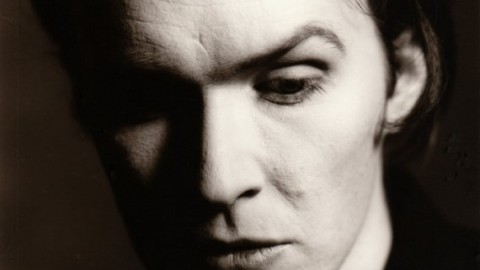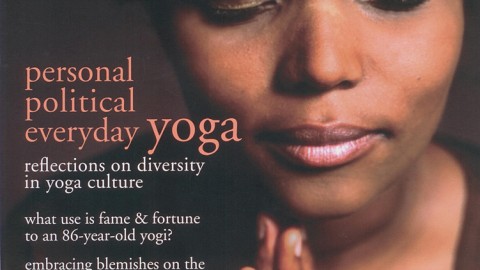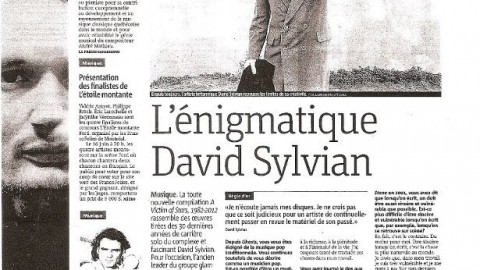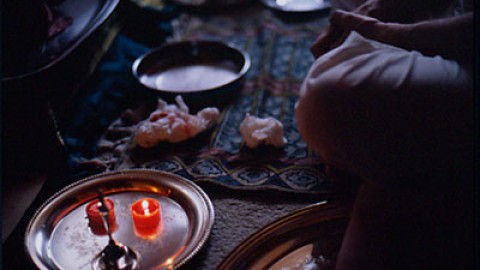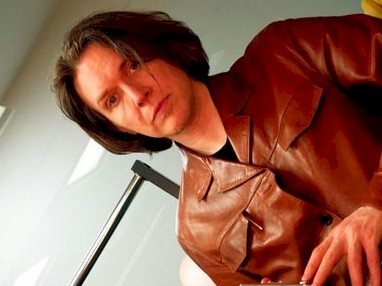
Originally published in 2003 by Danny Turner
Exclusive interview for Barcodezine, an online magazine and very Sylvian-minded. Excellent material.
Born David Batt in 1958, David Sylvian collectively formed the stylish new romantic outfit Japan in the late seventies, with brother Steve Jansen, Mick Karn and Richard Barbieri. After a clutch of early eighties hit records, Sylvian dissolved the band in late 1982, although the foursome later returned in 1991 to form the Rain Tee Crow project.
Upon leaving Japan, Sylvian embarked on a solo career, beginning with the acclaimed 1984 release, Brilliant Trees. This was hotly followed by the double-album, Gone To Earth in 1986, before the masterful Secrets Of The Beehive was presented to a glowing music press in 1987. All three albums blended Sylvian’s introspective spiritual awakening with an ethereal, ambient style, using keyboards, guitars and vocals added to a host of highly-respected session players.
Collaborations then followed, with Ryuichi Sakamoto (singles – Forbidden Colours, Heartbeat), Robert Fripp (album – The First Day) and Holger Czukay (albums – Plight & Premonition and Flux+Mutability), all managing to keep Sylvian afloat, whilst reinforcing his new found reputation as a musician of considerable artistic intergrity and credibility.
After meeting and later marrying singer and actress, Ingrid Chavez in 1992, Sylvian uprooted to Minneapolis, where the pair devoted themselves to Hindu mysticism and brought up their three children. It wasn’t therefore until 1999 that Sylvian’s solo career re-ignited with the album, Dead Bees On A Cake.
After a brief period in Napa Valley, California, the family have relocated to southern New Hampshire, where Sylvian has converted an old barn into a recording studio before completing his latest release – Blemish, a naked, highly experimental combination of electronics, guitar and vocals.
With Sylvian’s lengthy contract with Virgin Records finally at an end we thought it would be a good opportunity to ask David what the present and future holds:
I am presuming that the setting up of the Samadhi Sound label is a response to discarding the notion of working with a major label again? How is this likely to affect your future output, both in respect of the new freedom you are offered and the regularity of work you produce?
It isn’t out of the question that I’d consider working with a major label again although at the present time it seems an unlikely choice to make. I can’t place too much emphasis on the importance of freedom. I’ve been signed to a major label my entire adult life and while this afforded some sense of security, I was growing very tired of carrying the proverbial begging bowl which was so often met with indifference.
As to the question regarding the frequency with which I’ll produce work, this depends on numerous factors which are often times hard to predict. It’s possible a pattern of sorts will emerge over the coming two or three years.
What aspirations do you have for the label, will you be attempting to sign other recording artists?
The label is something of an experiment. I have no business aspirations as such, I simply wanted the freedom to choose which direction I should move in musically without concerns over ‘selling’ the idea of the work to company execs. Ironically, by choosing to start my own label I was choosing liberation from all business concerns that might even subconsciously influence the outcome of the sessions. By choosing to release the CD myself I felt all external pressures were off.
Time is an incredibly important resource in the world of the arts, something which the current climate often doesn’t allow for. Time to allow ideas to develop, to grow, time to fail, to start over. Due to my overriding love of the process of exploration, improvisation, and discovery, this is what I want the label to offer, time to develop ideas outside of the pressures of commerce, freedom for artists to explore whatever avenue of inquiry fires them and to share in the excitement of helping that work find its audience.
The new album, Blemish was recorded incredibly quickly in comparison to your previous works. Was there a deliberate attempt to consciously let go of the work and not over-scrutinise and perfect it as you may have done in the past?
I’d been living with the idea of the work for almost a year or so prior to writing, therefore, when it came time to actually start the work in process, I felt well equipped to proceed at speed so to speak. I’d given myself 6 weeks to write, record, and mix the work and due to the intense nature of the material I might not have been able to sustain the attention over a much longer duration.
Basically, different projects require different means. However, I’ve never entered into a work thinking it would take me more than a few months to complete but circumstances arise and you cope, you do your best, that is all.
Was there a pressure from the Virgin label that would have made it impossible for you to release this type of album until now?
Not so much pressure as indifference. The more uncommercial the work the greater the indifference.
What fascinates me about Blemish is how the melody of the vocal line is all that holds the tracks together, usually the reverse is true. Was it a deliberate attempt to let your vocal carry the burden to allow the music to express as much of the ideas and emotion as possible?
Each piece started out with a guitar improvisation as the basis for the composition. I immediately responded to that first take lyrically and melodically. Without time for reflection, alteration, the lyric was written, the vocal was recorded. The first piece completed was ‘The Only Daughter’. I heard it as a kind of monologue with musical accompaniment. I took that approach as the blueprint for creating the remaining tracks, all the while attempting not to repeat the process identically in anyway.
The Good Son seems to be a very provocative track, in fact it reminded me of your old single Pop Song, which sarcastically addressed the commercial aspect of songwriting. Was there a similar intent behind The Good Son?
I think it’s possible to take a song such as ‘Pop Song’ on different levels. I do believe it can be taken sincerely, after all I love the genre and the form of the pop song, or it can be taken as something of a critique. I saw it rather arrogantly as a possible blueprint for the future of pop music. ‘The Good Son’ is more straightforward in this respect being overtly critical in its stance.
Is it possibly to write an album such as Blemish without being accused of being somewhat conceited? Do you care?
I’m not sure why it should take a conceited person to create a work like ‘Blemish’. Do I care? If I believed myself conceited I would certainly go to work on that aspect of my nature as it would benefit my growth. Do I care that that might be how I am perceived by others who come into contact with the work? In all seriousness it isn’t possible to care about such things as there’s nothing I can do to change the perception.
I understand you are working on a project with Steve Jansen, can you tell me a little about this and any other long-term projects you are considering?
Steve and I are still writing material together in an attempt to map out a unique identity for this particular project. It is currently, predominately, electronically based. I have no other long-term projects under consideration outside of my own work.
What are your views on the downloading of music from the Internet? How can this be combated and how do you think the industry will have to adapt in the long-term future, including the effect it will have on your own Samadhi Sound label?
Obviously the industry remains confused and panicked. At this juncture little is clear outside of the simple fact that should people opt for free downloads over the purchase of the work in question then, other than those at the top of the commercial spectrum, artists will not be able to survive. The river will dry up at the source. No one should be asked to give away their body of work for free. It doesn’t happen in other professions and it’s confuses me why people should think it ok that it should be acceptable in the arts (this problem will ultimately affect many in the artistic community at large). Samadhi Sound is a small, personally owned, business. It’s a manageable scale. We’ll have wait to see how the current crisis effects us in the long run. There are a number of possible solutions to take. We’ll remain alert to these and flexible in our options including the choice to walk away.
Having lived in America for quite a long period time now, do you feel at all uncomfortable about the effect that the current political climate is having on your children? And with the intense criticism of the political situation in America, do you feel the country fairly represents the thoughts and opinions of the ordinary civilian?
I don’t think the current climate is effecting my children directly at present as they’re too young to understand, or take an interest in, current affairs. I feel profoundly uncomfortable by the stance this administration has taken on most issues and on world affairs in particular. I believe America to be the greatest terrorist threat to that of other, smaller, sovereign nations. I believe America has blatantly and consistently interfered in the affairs of other nations for the sake of its own interests. It doesn’t act out of compassion, it isn’t compelled to act based on moral values of right and wrong. What we see now is an unbridled power at work in the world with very little restraint. I don’t understand why it is so easy for this administration to pull the wool over the eyes of the seeming majority of this nation (I truly hope and suspect that this isn’t the case) using the fear and patriot cards. Many Americans appear to have a painfully subjective self image that they’re unwilling to see tainted. The ‘good’ that verses the ‘evil’. The white knight, the world police. World terrorist doesn’t sit well but instead of living in denial we should wake up to what is being said and done in our name, with our money. It’s due to the powerful propaganda machine in the States that ignorance of our leaders true actions and goals are sustained. We need to educate ourselves and others.
Do you still feel like a foreigner living in a foreign country and what do you miss about England, if anything?
I do feel like a foreigner living in a foreign country. Question is do I feel more at home anywhere else at this point in my life? The symptom of many an exile, even if self imposed. I miss England and Europe in general a great deal. I miss the global consciousness shared by many people there, I miss the comparatively liberal outlook, the lack of arrogance and blind patriotism, the lack of segregation in many aspects of life and culture. Most of all I miss its culture, its vibrancy, history, its hybrid nature (the natural cross fertilisation resulting from the lack of segregation).
How does your relationship with your guru, Amritapuri, influence your life on a day to day basis?
It underpins everything I do. It is the substratum upon which my life is built, it’s how I make sense of it. Nothing has meaning for me if it fails to acknowledgment all that that relationship represents.
On the subject of Gurus, something, that Jiddu Krishnamurti wrote has always stayed with me, he said: How can gurus really have any importance at all? If someone is a real or false guru, it is only a problem to himself. If the seeker is not a true seeker, what does it matter what the guru is? And if the seeker is authentic, then it will not matter at all if the guru is false. The only thing that matters is the nature of discontent. Have you crossed paths with Krishnamurtis teachings upon your travels?
I have. I’m not sure all of it sits well with me but there’s obviously enormous wisdom there.
During the lengthy writing and recording process of Dead Bees On A Cake, you spoke of nearly quitting music and turned to your guru for advice. I was curious to know how you could allow such an enormous part of your life to be determined by any other outside influence. In retrospect do you believe it would have been, or ever could be possible for you to live a life without music as a creative outlet?
I’m not saying it would’ve been easy necessarily, who learns anything from ‘easy’? but possible? yes, I think so. It is difficult to answer the remainder of the question as it would require an explanation of the nature of my relationship to my guru, what that is built upon, the truth of it as I see it. That would be another article entirely.
The promotional film that you made upon the release of the Dead Bees On A Cake album somewhat surprised me. It seemed to contradict your stance on personal privacy. What was the motivation behind revealing parts of your life to the world that had been previously locked away? And what part did the ego have to play in the process?
I was asked to put together an EPK for the ‘dead bees..’ album. As there was really no budget to work with I thought it best if Ingrid and I attempted it ourselves. The album’s subject matter is directly related to the experiences we shared as a family over a period of 5 years or so. I felt the only way to represent the work in this context was to, in some modest, somewhat impressionistic, way, depict the family itself. The experiences that provoked the creation of the material were of such an intangible nature how to otherwise go about showing something of the source? I felt the answer was to let down the guard enough to allow a glimpse at the lifestyle which nurtured the work. As I was in control of the direction of the film I didn’t feel my privacy was in anyway threatened. As for the ego, it surfaces under many guises. Who guards the privacy if not the ego? Where advances are made in the overriding of the ego isn’t always as obvious as it might appear.
I have read you say that music comes through you not from you. Are you implying there is an outside agent or, without wanting to sound to other-worldly, force, that is using you as a medium to express itself. This would appear to be at odds against the common perception that creativity is only the manifestation of a persons individual emotional expression?
There are times when the work created clearly goes beyond the individuals emotional expression. Inspiration isn’t something that one masters, rather it is a state of preparedness, or readiness which one recognises as being conducive to achieving the best results, not unlike a medium.
In what way does thought have its place in the creative process for you? When you are in the thick of composing music do you become absent of thought to prevent various types of conditioning from interfering with the creative process, perhaps almost a meditative state?
There are different scenarios but in an ideal one traditional thought processes appear suspended while work’s in progress. Akin to a meditative state might be a fair description.
Do you believe that the darker side of the human character will always be more interesting, stimulating and easier to convey through music? It seems that the greatest pieces of music or art often seem to come from those with a particularly troubled mind, either permanently or at a particular given time in their life. Many might say this was true of you with Secrets Of The Beehive which is acknowledged by so many as your greatest album?
The interest these works provoke might have a lot to do with where we focus our hearts and minds. Their popularity might be related to the cathartic nature of the works themselves. The longing and yearning often expressed in this kind of material is an expression, a primary aspect, of what it means to be alive, to be human. It is also an awareness of this state that potentially leads us on to question the nature of our lives, existence, and possibly discard all that we thought we knew in favor of an ‘intuitive wisdom’. At the very least it might serve as an aid to cognizance, opening up in a space, unlocked by the nature of the compositions themselves, where it feels ‘safe’ to do so, or as a possible wake up call.
It could also be argued that substantial creativity only comes through discontent. Is it important to keep the fire of discontent burning to continue to be creative and purify oneself?
Complacency is something to be wary of. I’m not fond of the word ‘discontent’ in this context. It implies for me an unnecessary friction between what I am and what I should be. Starting where you are is important, not from where you think you should be. Discontentment might well be the necessary impetus to provoke action but once that action is taken another quality, maybe that of aspiration or devotion, should ultimately take its place.
Do you get frustrated with the technological side of making an album? How much does modern technology interfere with the creative process?
Technology can interfere a great deal! With the constant technological developments it’s possible to feel permanently placed on the slant of a learning curve. Of course there are the usual technical problems, the maintenance etc. On the other end of the spectrum technology offers such wonderful tools, liberating, exciting, facilitating, envelope stretching, idea generating….can’t live with it, can’t live without it.
When I was younger you only needed to know how to hit a few chords on the guitar to make music. Sure, you can still work with those constraints but generally much more is asked of you as a musician….you must wear many hats. Producer, engineer, tech, composer, arranger, performer..the list goes on. It is a great relief to simply pick up that guitar sometimes and play….
Freud once wrote that the goals at which the artist is aiming are honour, power, riches, fame and the love of women. Do you believe there is an element of truth to this regarding modern musical culture and if so, did it apply to you in your early years with Japan
The reasoning behind why we do what we do is very complex. Maybe we can take love (why simply and restrictively ‘love of women’, I’d have thought love with a capital ‘L’) and honour as powerful motivators, the rest mentioned might be considered icing on the cake. I think there are equally important factors at work though, a need to make sense of the world, comparable to the naming of a new condition or leap in consciousness. A sound, a vision that encapsulates something in a way never before grasped….now that’s motivation enough. There’s a clarity and a sense of ‘in-tune-ness’ that accompanies such experiences that, while difficult to sustain or even recall successfully, appear to me to be a lot closer to the real causes of motivation once one has had the benefit of tasting them.
What part does ambition play in your life? Is there an ambition to continually improve as a musician or as a songwriter? Or does the continual process of self-learning automatically provide new challenges and therefore new avenues to explore?
I’d say the latter was true.
I had the pleasure of watching you perform in London in 2001. Unlike any other concert I had been to, I felt there was a sense of shared experience between the audience that I had never quite encountered before. As the concert progressed I also got the feeling that you were revered with almost a sense of awe. Is this reaction something you sense, and if so, does it make you uncomfortable? Although it is a commonplace relationship between artist and fan, do you believe it is healthy?
I can’t say that I’ve ever been aware of those qualities being present in an audience while performing. It remains outside of my experience and I’m happy to leave it that way.
Do you find when you collaborate that the more the input of others the less of you goes into the work due to the compromises that have to be made between musicians? Or can you not make compromises with such intensely personal work?
It depends on the setting. If the work is a collaborative project then the context implies compromise from the outset. The hope is that the level of compromise will be minimised by a shared vision. This obviously isn’t always the case. As for the solo work there’s a tendency to strive for a complete absence of compromise. This is impossible of course but it is a worthy pursuit which, in most cases, ultimately strengthens the work.
Do you have any regrets regarding your relationship with your brother Steve Jansen, Barbieiri & Karn, following on from the Rain Tree Crow project? Now that you have the freedom to work on any projects you wish, is there a possibility of a reunion at some point? I ask because there seems little doubt that you shared a natural musical kinship as a foursome?
It’s always dangerous to use the word ‘never’ but I would think it extremely unlikely that we would ever work together again. I have no desire to reform the group under any guise. What kinship there was (and yes, there certainly was kinship) has long since passed.
When you worked with Ryuichi Sakamoto on Dead Bees I gather that the sessions did not quite go as planned. Did this concern you at all, having always seemed to have such a wonderful natural connection with Ryuichi? Is it a matter of timing and can we hope for any fuller collaborations between you and Ryuichi?
It was a cause of frustration but not concern. Ryuichi and I have worked together on and off over the years and I’m certain this will continue to be the case.
The track that you recorded in 1998 with your wife, Ingrid Chavez, Whose Trip Is This is one of my all-time favourite tracks of yours. It seemed to show a more laid-back and cheerful side to your songwriting than I have ever heard before. Is working on a full album with Ingrid something you might like to pursue, or this musical direction at least?
I think my interest in pursuing that direction in music has past, at least for the time being. I was quite fond of ‘whose trip..’ myself and would love to hear someone else have a crack at recording the song. As for working with Ingrid, that is really down to her. Right now she’s passionate about her photography which she’s been pursuing for some time now. Should her passions be redirected in a musical direction…..
thanks Danny
David Sylvian interview, Barcode 2003
photo credit :- Ingrid Chavez 2003
DAVID SYLVIAN Blemish
(Samadhi Sound) sound-cd 0001/ RELEASE DATE: June 2003 Surprising new release from Sylvian, who was beginning to get a reputation for the scarcity of his studio productions. The release of ‘Blemish’, entirely produced and recorded in the space of 6 weeks earlier this year, is perhaps a deliberate attempt to let go of his work without over-scrutinising every single event, hence its incredibly raw, naked feel. Blemish is far more a reflection of Sylvians spiritual ideology than we have perhaps heard since Brilliant Trees, although this is far more confident and assured. Where ‘Dead Bees On A Cake’ used the likes of Talvin Singh and his very own guru to express the album’s ethereal musicality, here Sylvian expresses his cerebral manifestations lyrically, using Derek Bailey’s chopped guitar as an uncomfortable background palate to Sylvian’s own vocal melodic structures. On The Good Son, Sylvian remarks, He likes a good tune, so whistle one he knows, perhaps a sarcastic stab at the bewildering commercialism that is thrown at us at every turn? Who knows? Sylvians lyrical waxing is difficult to interpret and is often more suggestive than enforced. For those who might find Sylvian difficult to stomach in this mood, The Only Daughter should suffice. Its haunting tones and cut up expressionism provides utterly compulsive listening, with Sylvian giving one of the best vocal performances I can remember. Approach with an open mind and youre likely to encounter an intensely moving listening experience. Late Night Shopping provides more queasy listening, as Sylvian gives a seedy, nocturnal slant to the most mundane of lifes chores, whilst the album closes with A Fire In The Forest, using Christian Fennesz
dreamy melancholy keyboard arrangements to give further backing to another of Sylvians majestic vocal performances. Blemish sees
Sylvian at his experimental best, and whilst many people will no-doubt prefer his earlier works, and probably accuse him of being conceited, there is more than enough to latch onto with sufficient patience. The minds divisive, but the heart knows better, Sylvian croons on The Heart Knows Better, and to get the best out of Blemish you need to drop all preconceptions of the man and be as open and adventurous as Sylvian has during the albums conception.



